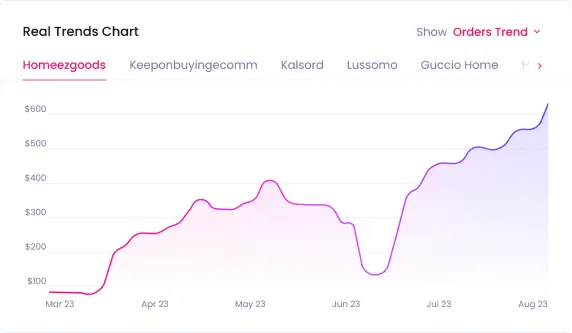15 Best WooCommerce Alternatives For Ecommerce Businesses
Contents
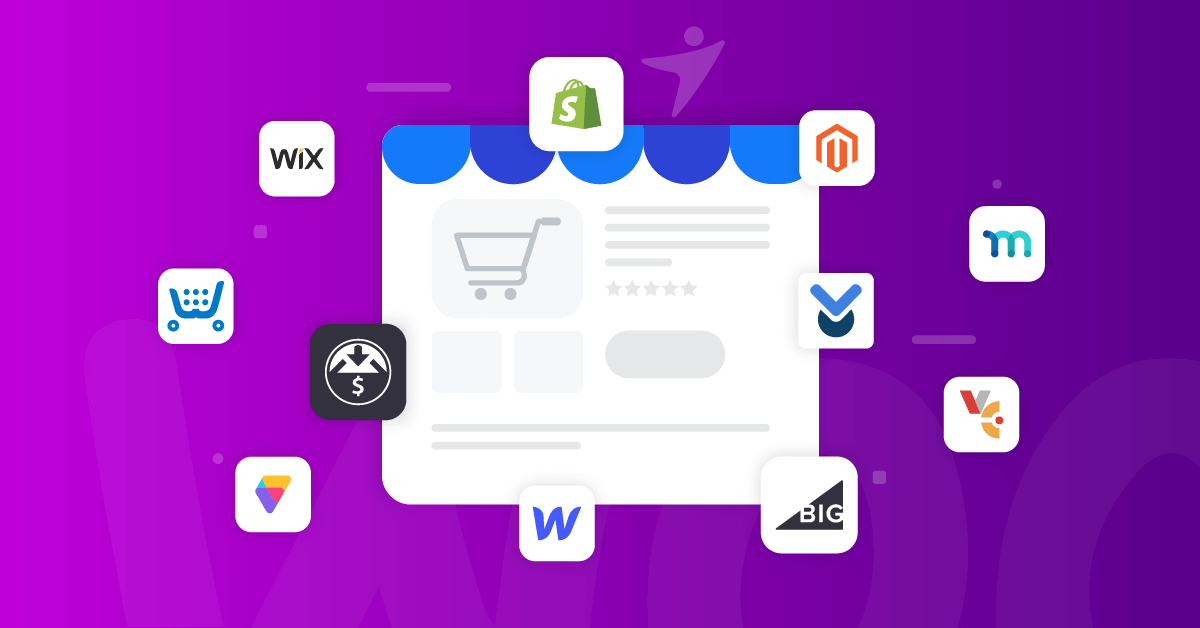
If WooCommerce doesn’t feel like the right fit for your eCommerce store, you’re not out of options. Many WooCommerce alternatives might suit your needs better, depending on your preferences.
From simpler tools to platforms with different features, this list covers 15 options worth considering. Let’s begin.
Key Takeaways
- Choosing the right eCommerce platform depends on your business needs, such as ease of use, scalability, and integration with your WordPress website.
- Fully hosted platforms like Shopify and BigCommerce handle hosting, updates, and security for a stress-free experience.
- Tools, like Sell The Trend, can enhance your WooCommerce store by automating dropshipping tasks and helping you find trending products.
- Platforms like WP Simple Pay, SellShop, and Easy Digital Downloads focus on simplicity, making them great for service-based businesses and digital product sales.
- Dedicated options like Salesforce Commerce are ideal for large-scale operations needing advanced features and scalability.
15 Top WooCommerce Alternatives For eCommerce Businesses
Here are the top WooCommerce alternatives to help you find the best fit for your online business. Consider factors like ease of use, scalability, and whether you need a fully hosted eCommerce platform or something that integrates with your WordPress website.
If you don’t have the time to read through, check out the quick overview in the table below:
|
|
Platform | Pricing | Best For |
| 1 | Shopify | Starts at $39/month | All-in-one solution for various business sizes |
| 2 | BigCommerce | Starts at $39/month | Businesses seeking built-in tools and scalability |
| 3 | Wix | Starts at $27/month | Small businesses or beginners desiring a simple setup |
| 4 | SellShop | Starts at $39/month | Entrepreneurs and dropshipping businesses seeking a simple, fully hosted solution. |
| 5 | MemberPress | Starts at $179/year | Membership sites with subscription management |
| 6 | Ecwid | Free plan available; paid plans start at $15/month | Selling across multiple platforms with ease |
| 7 | PrestaShop | Free (Open Source) | Customizable open-source platform for various business sizes |
| 8 | OpenCart | Free (Open Source) | Lightweight, open-source platform for efficient performance |
| 9 | Miva | Starts at $79.95/month | Established businesses requiring advanced features and scalability |
| 10 | FastSpring | Custom pricing | Selling digital products like software and subscriptions |
| 11 | G2 Deals | Varies by product | Accessing cost-effective software solutions |
| 12 | WP Simple Pay | Starts at $99.50/year | Service-based businesses needing quick payment acceptance |
| 13 | WPForms | Starts at $49/year | Businesses requiring advanced forms for lead capture and sales |
| 14 | Easy Digital Downloads | Free; premium extensions start at $99/year | Selling digital products like eBooks and software |
| 15 | Salesforce Commerce for B2C | Custom pricing | Enterprises needing robust, scalable solutions for B2C sales |
1. Shopify

Pricing: Starts at $29/month.
Best for: Businesses that want a reliable, all-in-one eCommerce platform without technical hassle.
Shopify is hands down the top WooCommerce alternative for its simplicity and efficiency. It’s a fully hosted platform, meaning you don’t have to manage hosting, updates, or security.
Unlike WooCommerce, which requires plugins and constant maintenance, Shopify gives you everything you need in one place.
Its intuitive tools and 24/7 support let you focus on growing your business, not troubleshooting your website. If you want a professional online store without the extra work, Shopify is the clear choice.
Key features:
- Hosting, SSL, and security built in.
- Drag-and-drop tools for designing your store.
- Integrated payment processing, including Shopify Payments.
- App store with thousands of add-ons for extra functionality.
- Mobile-friendly themes for seamless shopping.
- Advanced analytics and reporting to track growth.
- 24/7 customer support for quick problem-solving.
Shopify vs WooCommerce: What’s the Difference?
Shopify is a fully hosted, standalone platform that handles all the technical aspects for you. WooCommerce, on the other hand, requires WordPress, hosting, and plugins, which means more hands-on work.
Shopify simplifies the process, offering built-in tools and faster setup, making it the best WooCommerce alternative for ease of use and scalability
2. BigCommerce

Pricing: Starts at $39/month.
Best for: Businesses looking for built-in tools and a scalable platform.
If managing plugins and updates feels like too much work, BigCommerce might be a better fit. Unlike WooCommerce, which relies on WordPress and third-party tools, BigCommerce offers everything you need in one place. It’s designed for businesses that want to grow without worrying about technical details. Whether it’s SEO, multi-channel selling, or tracking performance, BigCommerce handles it for you, so you can focus on running your store.
Key features:
- Built-in SEO tools to help your store rank higher.
- Multi-channel selling on platforms like Amazon and Facebook.
- No extra fees for using third-party payment gateways.
- Unlimited products and bandwidth for growth.
- Easy customization with drag-and-drop tools.
- Analytics to monitor your store’s progress.
BigCommerce vs WooCommerce: What’s the Difference?
BigCommerce simplifies eCommerce by including features that WooCommerce often requires plugins for. It’s easier to manage as you scale since everything is built in, while WooCommerce can get more complicated over time. If you prefer a platform that handles growth seamlessly, BigCommerce could be the better choice
3. Wix

Pricing: Starts at $27/month for eCommerce.
Best for: Small businesses or beginners looking for a simple setup.
If you’re just starting out or don’t want to deal with complex setups, Wix could be the right choice. It’s beginner-friendly, with drag-and-drop tools that make building your store easy. Unlike WooCommerce, which needs WordPress and hosting, Wix takes care of everything for you. It’s a straightforward option if you want to create a store without spending hours figuring things out.
Key features:
- Drag-and-drop builder with customizable templates.
- Hosting, security, and updates all included.
- App marketplace for adding extra features like email marketing.
- Integration with social platforms for multi-channel selling.
- Simple tools for inventory and order management.
- Mobile-friendly templates for better customer experiences.
Wix vs WooCommerce: What’s the Difference?
Wix offers a simpler, all-in-one approach, while WooCommerce provides more customization but requires technical setup. If you want a platform that’s quick to use and easy to manage, Wix is a practical alternative to consider.
4. SellShop

Pricing: Starts at $39/month.
Best for Entrepreneurs and dropshipping businesses seeking a simple, fully hosted solution.
SellShop is a user-friendly eCommerce platform designed to make starting and managing an online business easy, especially for dropshipping. Unlike WooCommerce, which requires multiple plugins and manual setups, SellShop provides everything you need in one place. From sourcing trending products to automating order fulfillment, it streamlines operations so you can focus on growing your store.
Key features:
- 1-Click Store Creation for quick setup without technical knowledge.
- Built-in Product Sourcing to find and add trending products easily.
- Automated Order Fulfillment to save time and avoid errors.
- Mobile-Optimized Stores for a seamless shopping experience on all devices.
- Integrated Marketing Tools like upselling and related product recommendations.
- Fast Page Load Times to improve customer experience and conversions.
SellShop vs WooCommerce: What’s the Difference?
SellShop simplifies the process with its fully hosted eCommerce platform, offering built-in tools for product sourcing, marketing, and fulfillment. WooCommerce, while highly customizable, requires a WordPress website and plugins to achieve similar functionality. This can involve a steep learning curve and ongoing maintenance.
For dropshipping businesses or entrepreneurs looking for an easy-to-use online store builder with all the features in one package, SellShop is a strong alternative. WooCommerce, on the other hand, is better suited for users who prioritize extensive customization and already work within the WordPress ecosystem.
5. MemberPress
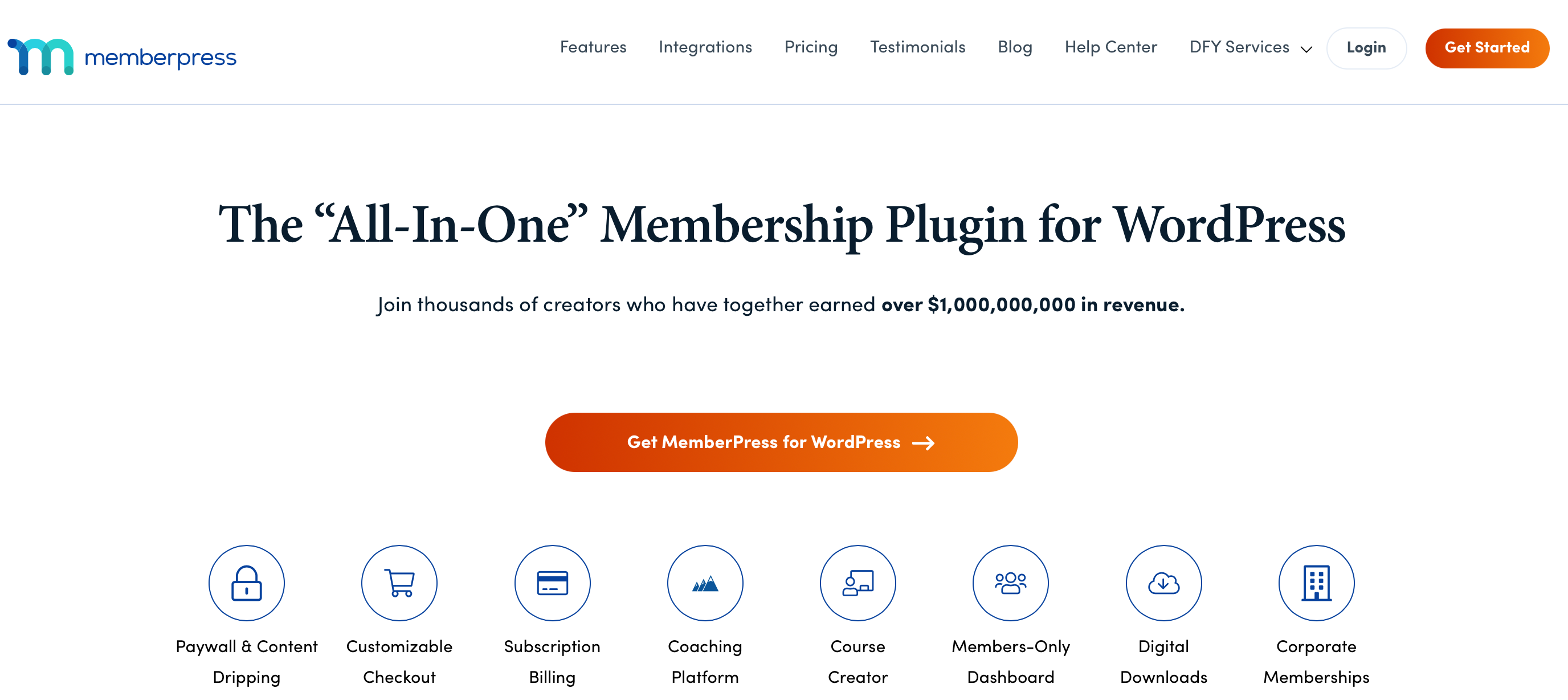
Pricing: Starts at $179/year.
Best for: Businesses focused on memberships or subscriptions.
If your business revolves around memberships or subscriptions, MemberPress might suit you better than WooCommerce. While WooCommerce can handle subscriptions with plugins, MemberPress is specifically built for this, making it more straightforward and efficient. You can create gated content, manage memberships, and handle recurring payments without juggling extra tools.
Key features:
- Built-in membership and subscription management tools.
- Gated content access for exclusive materials.
- Seamless integration with WordPress.
- Recurring billing and automated payment reminders.
- Customizable membership tiers.
- Analytics to track subscription performance.
MemberPress vs WooCommerce: What’s the Difference?
MemberPress focuses on memberships and subscriptions, making it more specialized than WooCommerce. While WooCommerce offers broader eCommerce options, MemberPress provides a more streamlined experience for businesses needing recurring revenue features.
6. Ecwid
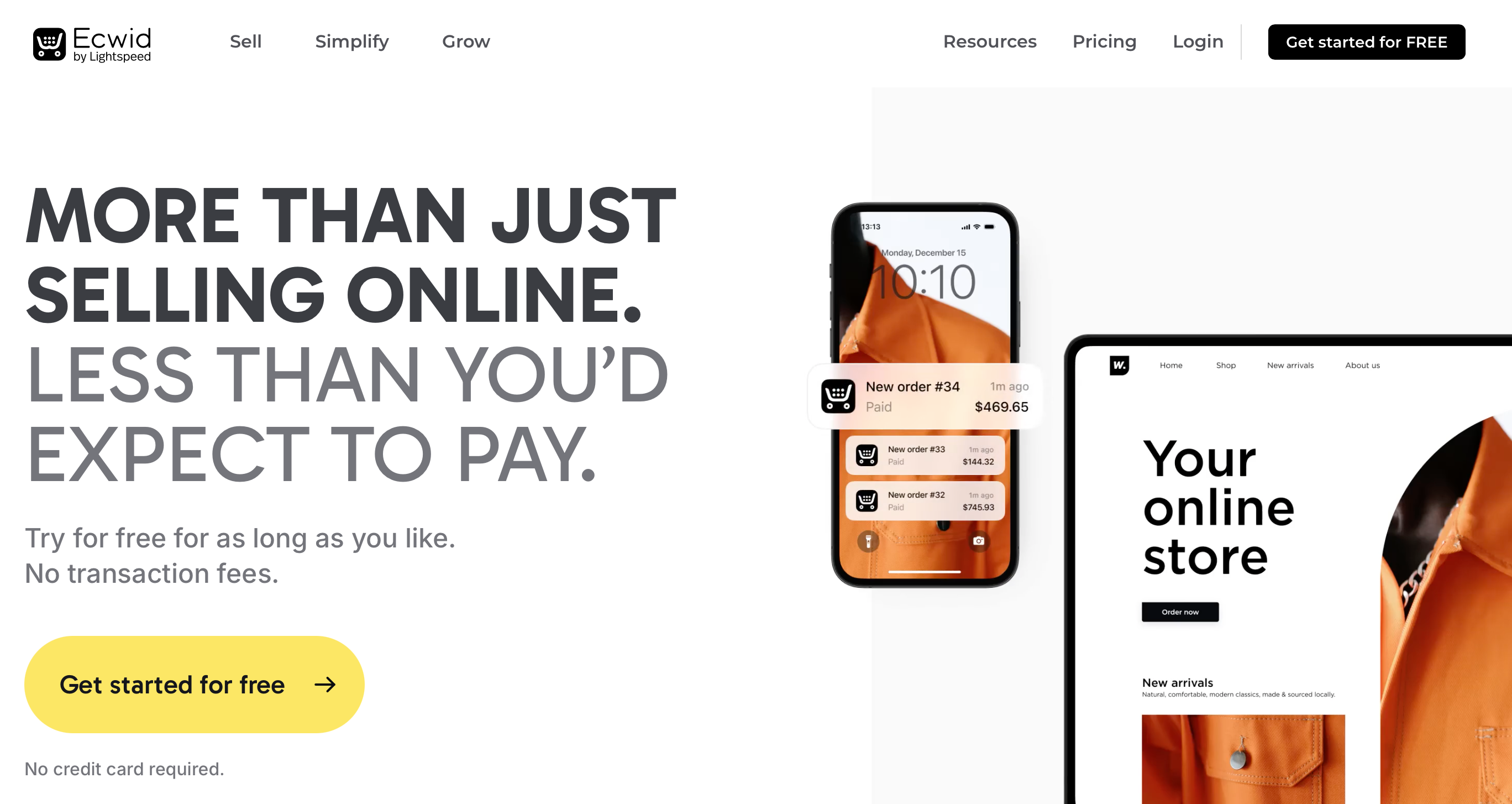
Pricing: Free plan available; paid plans start at $15/month.
Best for: Businesses wanting to sell across multiple platforms easily.
If you’re looking for a way to sell on different platforms without being tied to a single website, Ecwid is a flexible option. Unlike WooCommerce, which only works on WordPress, Ecwid allows you to integrate your store into existing websites, social media, or marketplaces. It’s especially helpful for small businesses that want to reach customers wherever they are without needing a separate eCommerce website.
Key features:
- Easy integration with websites, social media, and marketplaces.
- Free plan to start selling with basic tools.
- Multi-channel support, including Facebook and Instagram.
- Mobile app for managing your store on the go.
- Built-in tools for taxes, shipping, and inventory.
- Secure hosting included.
Ecwid vs WooCommerce: What’s the Difference?
Ecwid stands out for its flexibility, allowing you to sell on multiple platforms while keeping your setup simple. WooCommerce, on the other hand, is tied to WordPress, meaning you need a WordPress site to use it.
Ecwid doesn’t require you to build a new site—it can seamlessly embed into your existing website or social media pages. This makes it a good choice if you already have an online presence and just want to add eCommerce capabilities.
WooCommerce offers more customization, but that comes with added complexity. You’ll need to manage hosting, security, and plugins. Ecwid eliminates these concerns by providing a fully hosted solution that works wherever you need it. If you value simplicity and multi-platform selling, Ecwid is the better fit.
7. PrestaShop

Pricing: Free to use, but hosting and add-ons have costs.
Best for: Businesses looking for a customizable open-source platform.
PrestaShop is a good WooCommerce alternative if you’re comfortable managing an open-source platform. Like WooCommerce, PrestaShop is free to use, but it doesn’t rely on WordPress. It’s a standalone eCommerce platform with more built-in features, so you don’t need as many plugins to get started. However, it does require hosting and technical knowledge to set up and maintain.
Key features:
- Open-source for complete customization.
- Multi-language and multi-currency support for global stores.
- Advanced inventory management tools.
- Add-ons available for additional features.
- SEO-friendly structure to improve visibility.
- Supports multiple payment gateways.
PrestaShop vs WooCommerce: What’s the Difference?
While both platforms are free, PrestaShop is a standalone solution, while WooCommerce requires WordPress. PrestaShop comes with more built-in features, so you won’t need as many add-ons as you would with WooCommerce. However, it requires more technical know-how and hosting setup, which can add complexity.
WooCommerce is easier to use for WordPress users, especially if you’re already familiar with the platform. PrestaShop is better suited for those who want a flexible, open-source option that doesn’t depend on WordPress but are willing to handle the technical side of things.
8. OpenCart
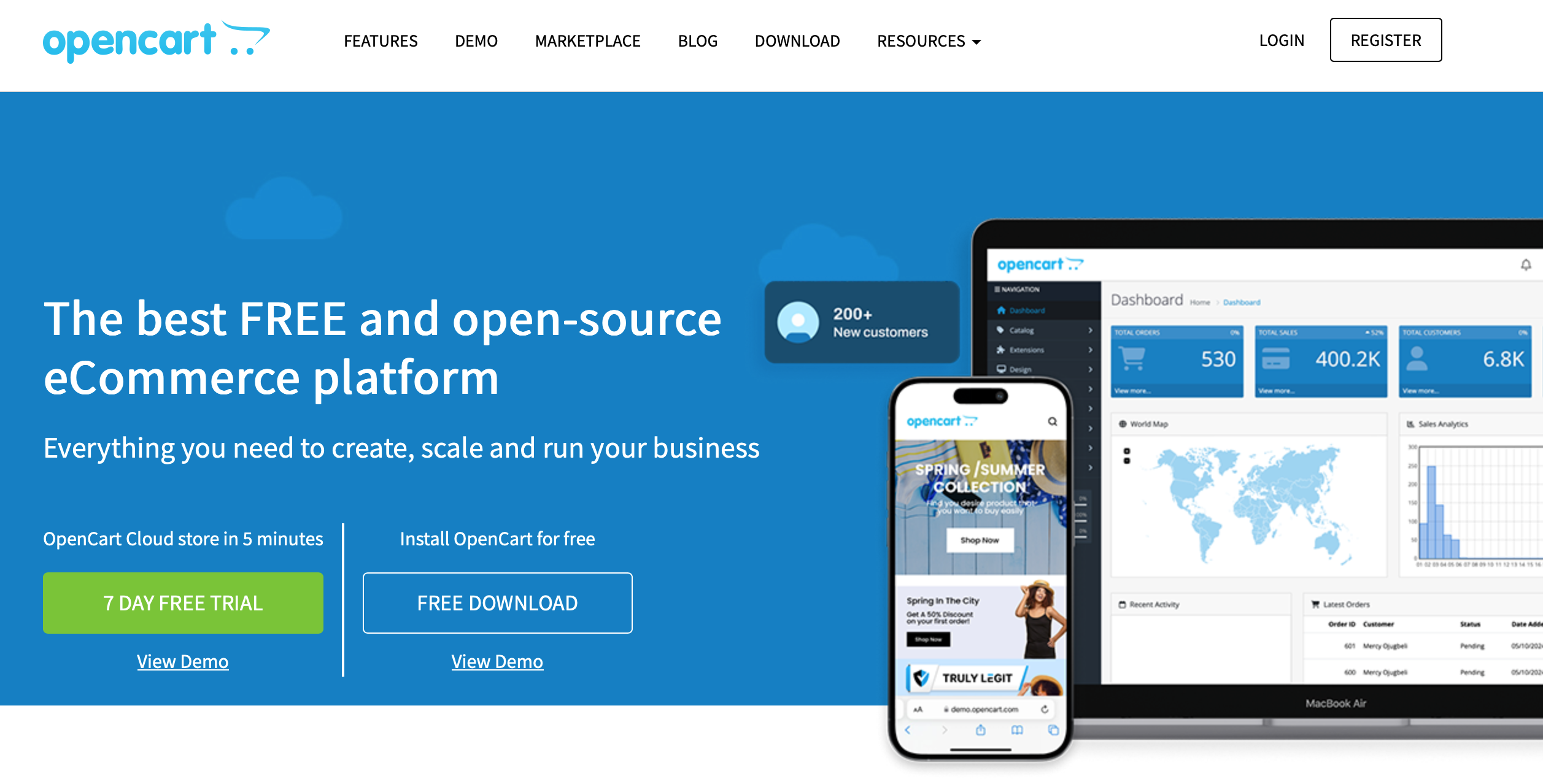
Pricing: Free to use, with paid extensions available.
Best for: Businesses wanting a lightweight, open-source platform.
OpenCart is another open-source WooCommerce alternative that focuses on simplicity and performance. It’s lightweight, meaning it runs efficiently even with a large catalog of products. Unlike WooCommerce, OpenCart isn’t tied to WordPress, so you have more flexibility in your hosting and design choices. It’s free to use, but you’ll need to pay for hosting and possibly some extensions to enhance functionality.
Key features:
- Lightweight and efficient for faster performance.
- Open-source for full customization.
- Multi-store support from a single admin panel.
- Supports multiple currencies and languages.
- Extensions available for added functionality.
- Detailed analytics and reporting tools.
OpenCart vs WooCommerce: What’s the Difference?
OpenCart is standalone, while WooCommerce works within the WordPress ecosystem. OpenCart’s lightweight nature makes it faster and more efficient, especially for stores with a large number of products. WooCommerce can become resource-heavy as your store grows, which may impact performance.
WooCommerce offers more extensions and integrations, especially for WordPress users, but OpenCart provides a simpler setup with fewer dependencies. If you’re looking for a streamlined platform that doesn’t rely on WordPress, OpenCart is worth considering.
9. Miva
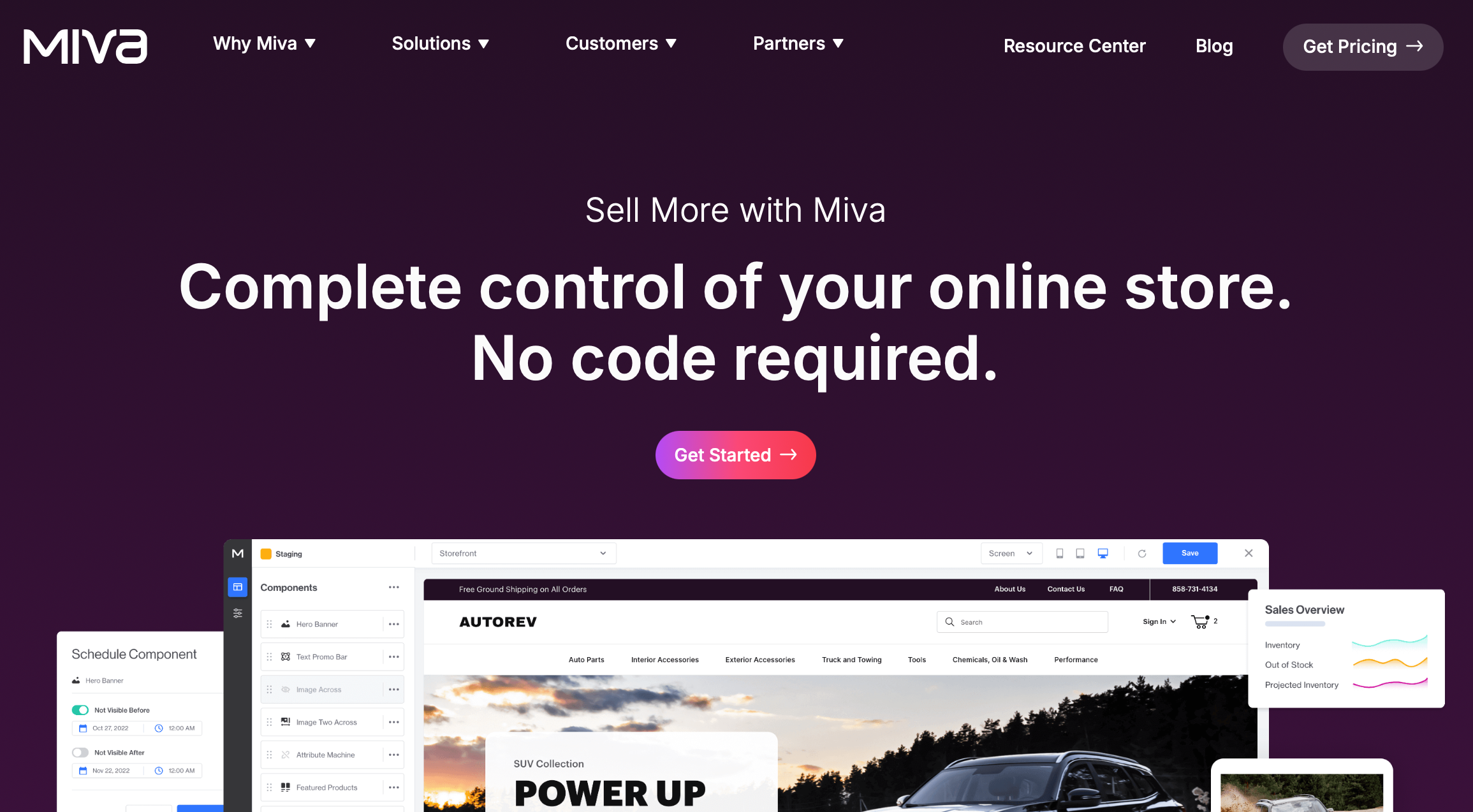
Pricing: Starts at $79.95/month.
Best for: Established businesses that need advanced features and scalability.
Miva is a premium WooCommerce alternative designed for businesses that require robust tools and scalability. Unlike WooCommerce, which relies on plugins for advanced features, Miva offers enterprise-level solutions right out of the box. It’s a fully hosted platform, so you won’t have to worry about managing servers or updates, but it comes with a higher price tag.
Key features:
- Advanced tools for inventory and order management.
- Built-in SEO and marketing features.
- Multi-channel integration for selling across platforms.
- Customizable checkout experiences.
- Detailed reporting and analytics for insights.
- Reliable hosting with excellent uptime.
Miva vs WooCommerce: What’s the Difference?
Miva is a fully hosted platform, while WooCommerce is self-hosted, meaning you need to manage hosting and updates. Miva includes enterprise-grade tools out of the box, making it better for larger businesses with complex needs. WooCommerce is more affordable and customizable but requires additional plugins and maintenance to match Miva’s functionality.
If you need advanced tools and want to avoid managing technical details, Miva is a strong choice. However, if budget and customization are more important, WooCommerce might be a better fit.
10. FastSpring
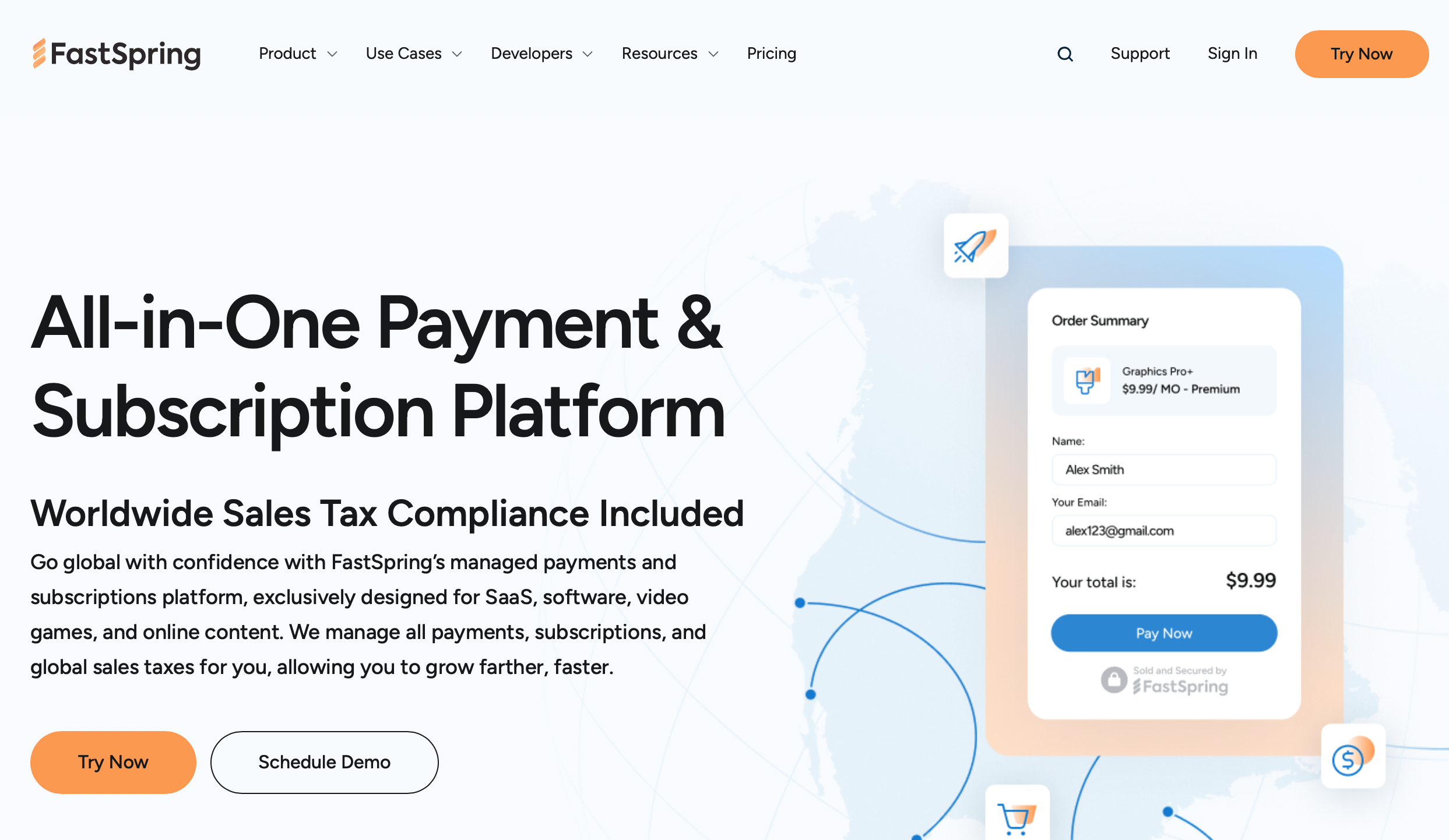
Pricing: Custom pricing based on sales volume.
Best for: Businesses selling digital products like software and subscriptions.
FastSpring is a WooCommerce alternative tailored for businesses focused on digital products. Unlike WooCommerce, which requires plugins for selling digital items, FastSpring specializes in this area, offering built-in tools for subscriptions, global payments, and tax management. It’s fully hosted, so you don’t have to worry about technical maintenance, but its pricing depends on your sales volume.
Key features:
- Built-in tools for managing subscriptions and renewals.
- Global payment processing with multiple currencies.
- Automated tax calculations for compliance.
- Secure hosting with fraud protection.
- Analytics for tracking sales performance.
- Customizable checkout to match your branding.
FastSpring vs WooCommerce: What’s the Difference?
FastSpring is specifically designed for digital products, offering features like subscription management and automated taxes that WooCommerce only provides through plugins. It’s a fully hosted solution, so you don’t need to handle hosting or updates.
WooCommerce offers more flexibility for physical and digital products but requires additional setup for specialized features.
If your business focuses solely on digital products, FastSpring provides a more streamlined and efficient solution. For businesses needing a mix of product types, WooCommerce might still be the better option.
11. G2 Deals
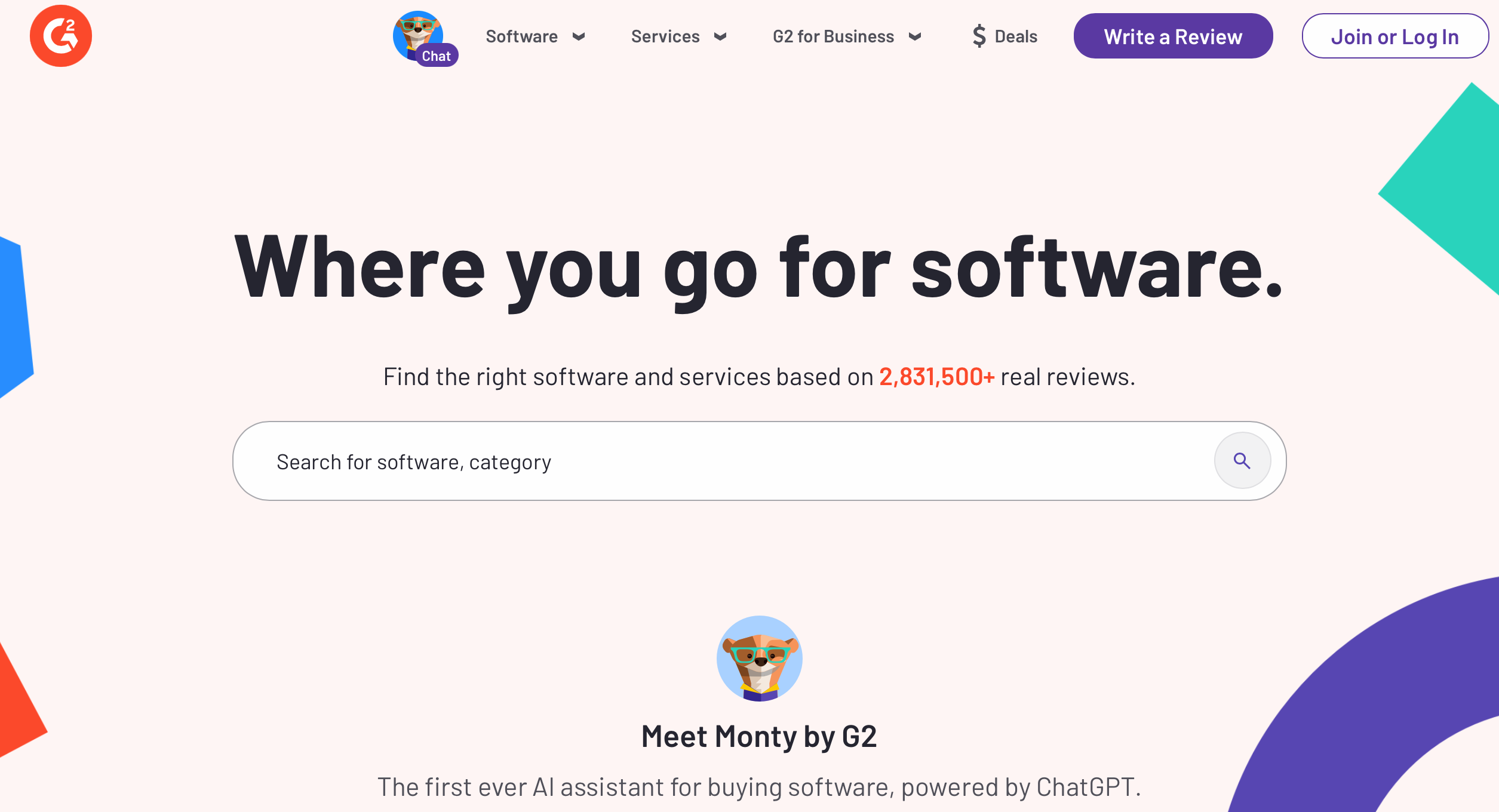
Pricing: Varies based on the tools or software purchased.
Best for: Businesses seeking cost-effective software solutions to enhance operations.
G2 Deals is a marketplace where businesses can find and purchase software tools at discounted prices. It’s not a traditional eCommerce platform like WooCommerce but instead complements eCommerce by providing the tools needed for smoother backend operations.
Key features:
- Software bundles at discounted rates.
- Tools for marketing, CRM, and analytics.
- Reviews and ratings from real users to guide decisions.
- No hosting or technical setup required.
- Options tailored for small and medium-sized businesses.
G2 Deals vs WooCommerce: What’s the Difference?
G2 Deals and WooCommerce serve entirely different purposes. WooCommerce is a WordPress plugin designed to create and manage online stores, whereas G2 Deals is a marketplace offering software solutions for operational efficiency.
If you’re happy with your current store setup but need software to streamline operations, G2 Deals is a strong option. However, if you’re starting from scratch and need to build an online store, WooCommerce (or another eCommerce platform) is the better fit. G2 Deals excels in providing cost-effective tools for scaling and optimizing an existing business rather than creating one.
12. WP Simple Pay
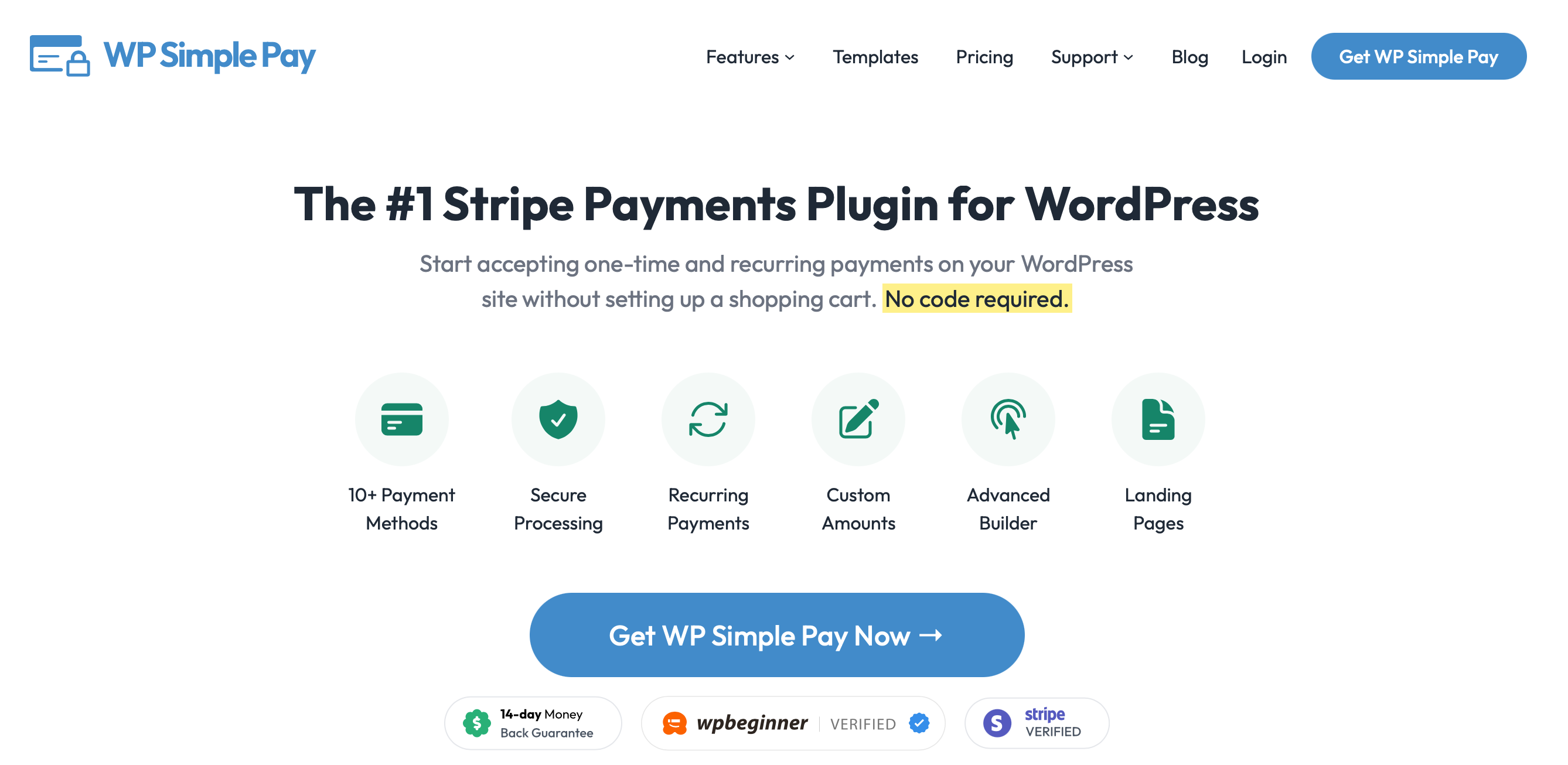
Pricing: Starts at $99.50/year.
Best for: Service-based businesses and creators needing a quick way to accept payments online.
WP Simple Pay is a WooCommerce alternative designed for businesses that want to accept payments without setting up a full eCommerce store. It’s perfect for service providers, nonprofits, or creators selling one-off products or subscriptions.
Unlike WooCommerce, WP Simple Pay focuses solely on payment collection, making it lightweight and straightforward. You don’t need to deal with carts, complex setups, or unnecessary features—just simple, secure payment options for your customers.
Key features:
- Supports one-time payments, subscriptions, and installment plans.
- Integration with Stripe for secure payment processing.
- Easy-to-use payment forms without coding.
- Supports Apple Pay, Google Pay, and credit cards.
- Option to customize forms with branding and design.
- No need for a shopping cart or product catalog.
WP Simple Pay vs WooCommerce: What’s the Difference?
The main difference lies in complexity and purpose. WP Simple Pay is a payment-focused tool, ideal for businesses that only need to collect payments without building a full online store. WooCommerce, on the other hand, is a full eCommerce solution designed for selling multiple products and managing a catalog with a shopping cart.
If you value simplicity and only need payment collection, WP Simple Pay is a better choice. WooCommerce is best suited for businesses needing broader eCommerce capabilities.
13. WPForms
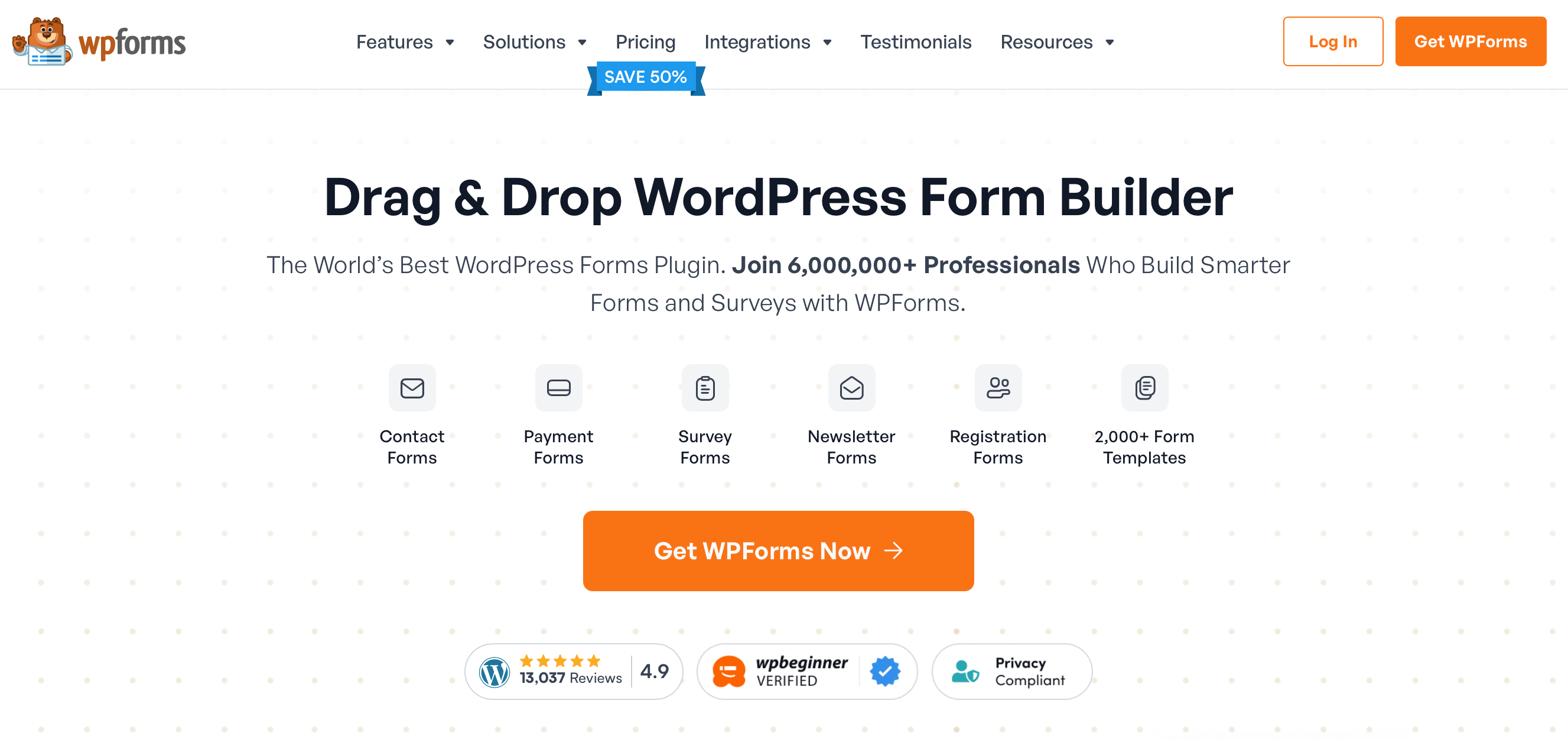
Pricing: Starts at $49/year.
Best for: Businesses that need advanced forms for lead capture and sales.
WPForms isn’t a traditional eCommerce platform but serves as a WooCommerce alternative for businesses focused on lead generation or service-based sales. If you sell services or digital products through custom forms rather than an online store, WPForms might be the right choice. It’s easy to use and integrates well with WordPress, simplifying the checkout process.
Key Features:
- Drag-and-drop form builder for easy customization.
- Integration with payment gateways like PayPal and Stripe.
- Advanced form features like conditional logic and file uploads.
- Secure form submissions to protect customer data.
- Analytics to track form performance.
WPForms vs WooCommerce: What’s the Difference?
WPForms is designed for creating custom forms to collect payments or leads, while WooCommerce is focused on managing online stores. If your business relies on forms for bookings, services, or one-time sales, WPForms is a better fit. WooCommerce is more suitable for businesses selling multiple products with traditional shopping cart functionality.
14. Easy Digital Downloads
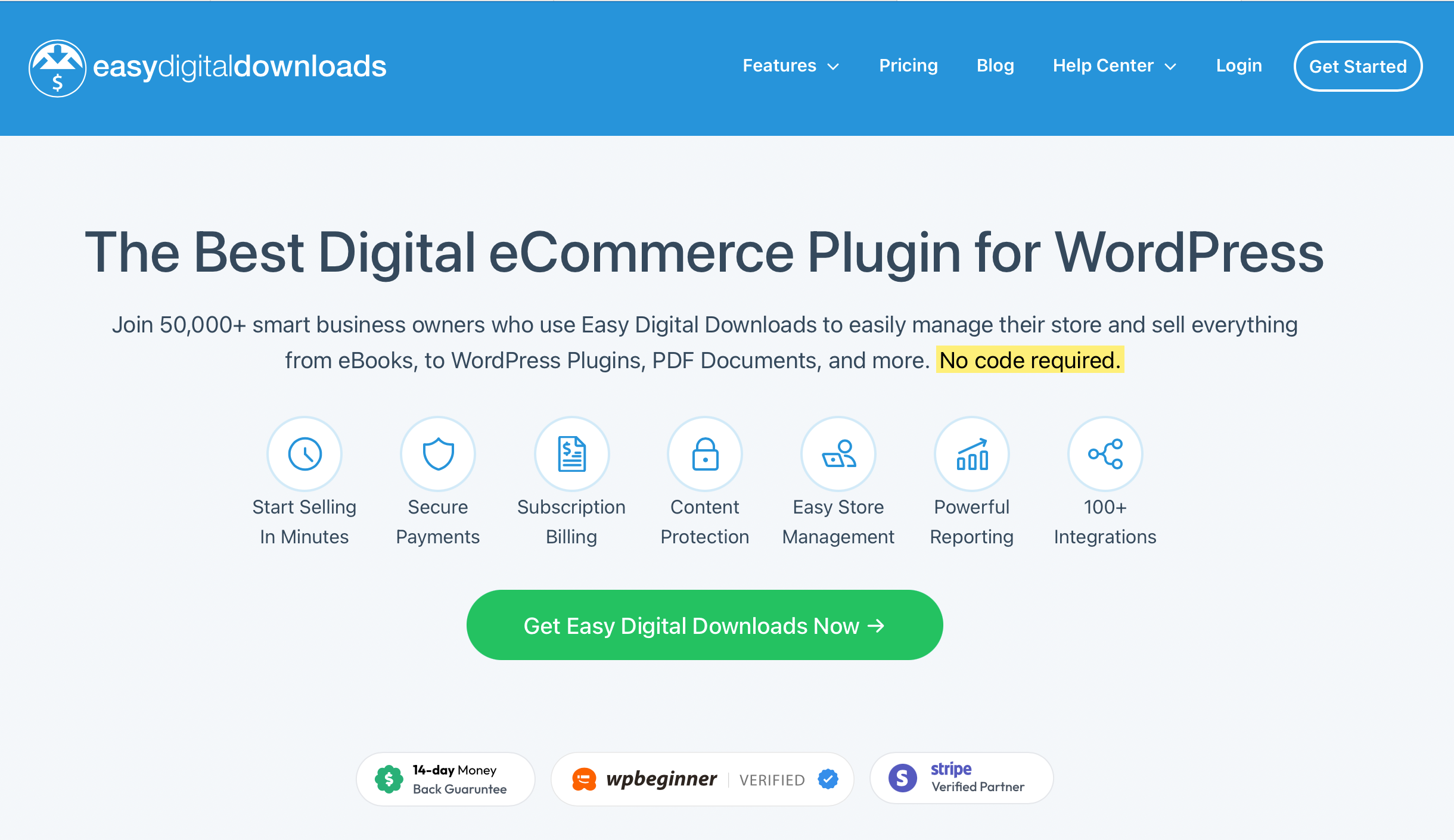
Pricing: Free, with premium extensions starting at $99/year.
Best for: Businesses that focus on selling digital products.
Easy Digital Downloads (EDD) is a WooCommerce alternative specifically designed for selling digital products. Unlike WooCommerce, which needs plugins to handle digital goods efficiently, EDD is built for this purpose. It simplifies managing licenses, downloads, and recurring payments, making it a go-to for creators of software, eBooks, and other digital products.
Key features:
- Built-in tools for selling digital downloads.
- Supports recurring payments and subscriptions.
- Seamless integration with WordPress.
- Analytics to track product performance.
- Extensions for features like email marketing and payment gateways.
EDD vs WooCommerce: What’s the Difference?
EDD is focused entirely on digital products, while WooCommerce offers broader functionality for both physical and digital goods. If your store primarily sells downloads or software, EDD simplifies the process with specialized tools. WooCommerce is more versatile but less optimized for digital-only businesses.
15. Salesforce Commerce for B2C
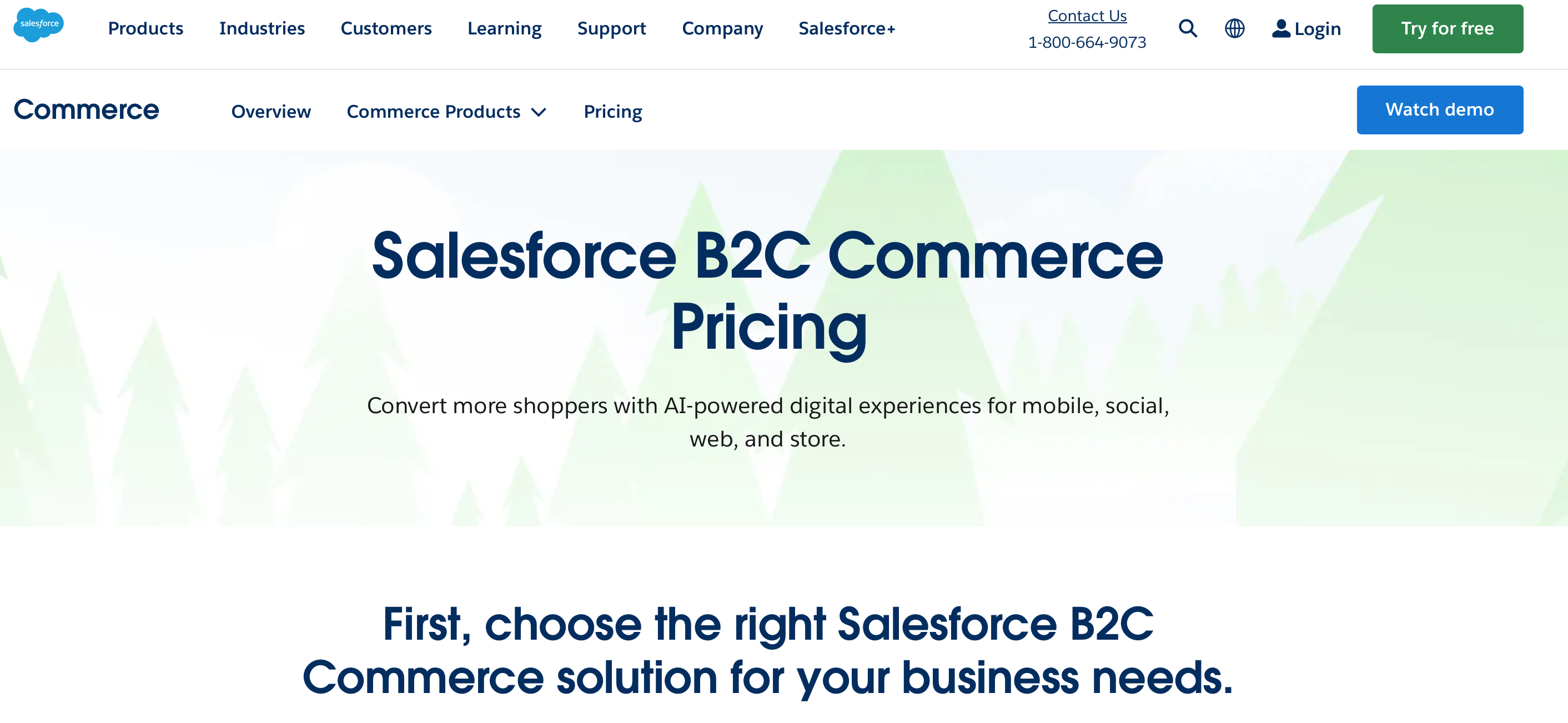
Pricing: Custom pricing based on business needs.
Best for: Enterprises needing a robust, scalable solution for B2C sales.
Salesforce Commerce for B2C is a comprehensive eCommerce platform tailored for large-scale businesses. Unlike WooCommerce, which is best for small to mid-sized stores, Salesforce Commerce is built for enterprise-level operations. It offers advanced tools for managing global stores, customer data, and personalized shopping experiences.
Key features:
- AI-powered tools for personalized customer experiences.
- Multi-channel selling across web, mobile, and social.
- Advanced analytics for insights into customer behavior.
- Seamless integration with the Salesforce ecosystem.
- Scalable infrastructure for global businesses.
Salesforce Commerce vs WooCommerce: What’s the Difference?
Salesforce Commerce focuses on scalability and enterprise-level functionality, while WooCommerce is more suited for small and medium businesses. Salesforce provides tools for managing complex operations, including AI-driven personalization and deep integrations with other Salesforce tools like CRM.
WooCommerce, while highly customizable, can struggle to scale for large enterprises and lacks the built-in advanced features Salesforce offers.
Woocommerce Alternatives: FAQs
Here are common questions when deciding between eCommerce platforms like WooCommerce and other options.
1. Is There A Better Option Than WooCommerce?
It depends on your needs. WooCommerce is great for WordPress websites, but other options like Shopify or BigCommerce might work better if you want a fully hosted eCommerce platform. These platforms handle hosting, security, and updates, making them easier to use.
If you need a dedicated eCommerce platform with all the features built-in, WooCommerce alternatives like these might suit your online business better.
2. Is WooCommerce The Best eCommerce Platform?
WooCommerce is highly flexible and integrates seamlessly with your existing WordPress website, but it’s not for everyone. It requires you to manage hosting, plugins, and updates. If you prefer an online store builder that simplifies setup and includes search engine optimization tools, platforms like Wix or Shopify might be better options for some businesses.
3. How To Sell Products Without WooCommerce?
You can use other eCommerce platforms like Ecwid, BigCommerce, or Squarespace. These platforms are user-friendly and work well even if you don’t have a WordPress website. If you’re already on WordPress, plugins like Easy Digital Downloads or MemberPress can help you sell products without relying on WooCommerce.
4. Is Ecwid Better Than WooCommerce?
Ecwid is a great alternative if you want to sell products across multiple channels without building a new site. It integrates easily with your existing WordPress website and works as a fully hosted eCommerce platform. Unlike WooCommerce, it’s simpler to use and requires less maintenance. For small businesses that value ease of use, Ecwid might be the better choice.
Conclusion
Finding the right eCommerce platform is key to building a successful online business. Whether you prefer the flexibility of WooCommerce or need a fully hosted eCommerce platform, there’s an option for every need.
Consider your goals, technical skills, and the features that matter most. With the right platform, you can create a seamless shopping experience and grow your business with confidence.



